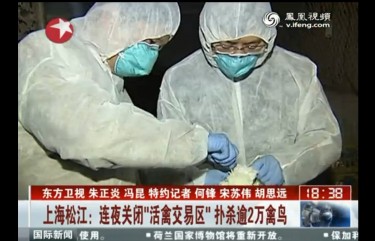In China, a strain of avian flu never before seen in humans has so far infected 21 people [1], with six deaths [2], putting health authorities on high alert and prompting fears among many Chinese of the disease spreading.
The first reported death associated with the H7N9 virus was an 87-year-old man who died March 4, 2013 in the commercial hub of Shanghai, a city of some 20 million residents. More cases were soon diagnosed in the neighbouring Zhejiang, Anhui, and Jiangsu provinces, sparking speculation that nearly 15,000 dead pigs found in a Shanghai river [3]last month might have contributed to the outbreak.
The Chinese government has so far rebuffed [4] [zh] any correlation. An official investigation is underway to pinpoint the source of the virus and exactly how humans have contracted it.
In Shanghai, officials ordered the slaughter [5] of more than 20,000 birds at a local food market on March 5, 2013 where the H7N9 virus was detected in samples taken from pigeon [6] a day earlier. The city also suspended live poultry trade to prevent further spread of the virus.
Two days later in Nanjing, the capital city of Jiangsu where six human cases of H7N9 were detected, authorities followed suit [7] by shutting down all live poultry trade markets in the city.
Sina Weibo, China's equivalent of Twitter, has been abuzz as users speculated about the origin of the virus, criticized mainland media's coverage of the outbreak, and drew comparisons between H7N9 and the country's SARS outbreak a decade ago. The topic has generated some four million comments [8] so far and was among the top 3 trending topic on April 7, 2013.
Yiyi Chuang Jianghu from Henan wondered [9]on the microblogging service about the relationship between the dead pigs and the virus:
好想知道死猪与H7N9有无关系。。
I very much want to know if the dead pigs were related to H7N9…
Shanghai top headlines, a Weibo account dedicated to updates of H7N9 information, questioned [10]:
#H7N9# [11]@施力勤 [12]: 江苏南通一例,在救护车上已死亡(@任伟NICKY [13]),H7N9重灾区同时也是发现大量死猪区域,没有联系吗?
#H7N9# [11] @ShiLiqin: There was once case in Nantong of Jiangsu, [the patient] died in the ambulance (@RenweiNICKY), the hardest hit areas of H7N9 are the areas where lots of dead pigs were found, is there no correlation?
The discovery of human cases of H7N9 invoked memories of the outbreak severe acute respiratory syndrome [14] (SARS) in 2003, which emerged from China and was initially covered up before it spiraled into a global health crisis that claimed some 800 lives worldwide.
Traditional Chinese media this time have responded with relatively more transparency and openness to the avian influenza than it did with SARS. Newspapers [15] have run articles updating infection numbers and calling on people to avoid live poultry.
But the country's state-run media CCTV was one notable exception. The broadcaster's widely watched 7 p.m. Xinwen Lianbo [16] news program on April 5, 2013 made no mention of the H7N9 avian influenza, drawing criticism online [17] for its silence.
Prominent Chinese writer Li Chengpeng offered [18]his mixed feelings on Weibo about the media coverage:
禽流感各国都有,时时也爆发,全球医界也没神药。可别人信息透明,这里却总辟谣+捂盖子。说实话这次透明度超过 10年前非典,但仍不够,因面对重大疫情,你除了解决疫情本身还要缓解惶惶民心。这才是常态治国。呼吁去亚马逊看雨林的央视今晚多报道疫情。别老伸话筒 问:你幸福吗。我只好答:我幸……存。
Avain influenza happens in every country, and every now and then, the medical circles still don't have effective medicines. But information is transparent in other countries whereas here what we do is refute rumors and cover things up. To be frank, information transparency has surpassed that of ten years ago, but it is still not enough, in the face of a major epidemic, you need to calm a jittery public apart from solving the epidemic itself. This is what a country needs to do. I pledge that CCTV should report on the epidemic instead of broadcasting rainforests in the Amazon. Don't stick out your mic and ask, “Are you happy?” I can only answer: “I …. survived.”
Guan Qingyou commented [19] on the parallels between SARS and H7N9 avian influenza:
经历过SARS,因而我们对H7N9充 满恐惧。十年轮回,经济都处于新周期的起点。目前尚不知H7N9是否会广泛传播,故很难量化经济影响。首先冲击心理。节前港股暴跌即与此有关;其次影响消 费。人们会减少外出就餐、出行、旅游,消费本已羸弱,此次雪上加霜。再次影响工业。中间会有时滞,也要视H7N9传播程度。
We are very fearful of H7N9 because we've gone through SARS[ten years’ ago]. Ten years’ later, China's economy has taken on a new starting point. It's now unclear if H7N9 will spread widely, so it's hard to quantify its impact on the economy. First, psychological impact will take effect. The plunging of Hong Kong stocks before the holiday had something to do with this. Second, consumption will be affected. People will cut back on eating outside and travelling, consumption is already very weak, [the avian influenza] adds insult to the injury. Then industrial output will be affected. There might be suspensions now and then, all dependent on the intensity of H7N9's spread.